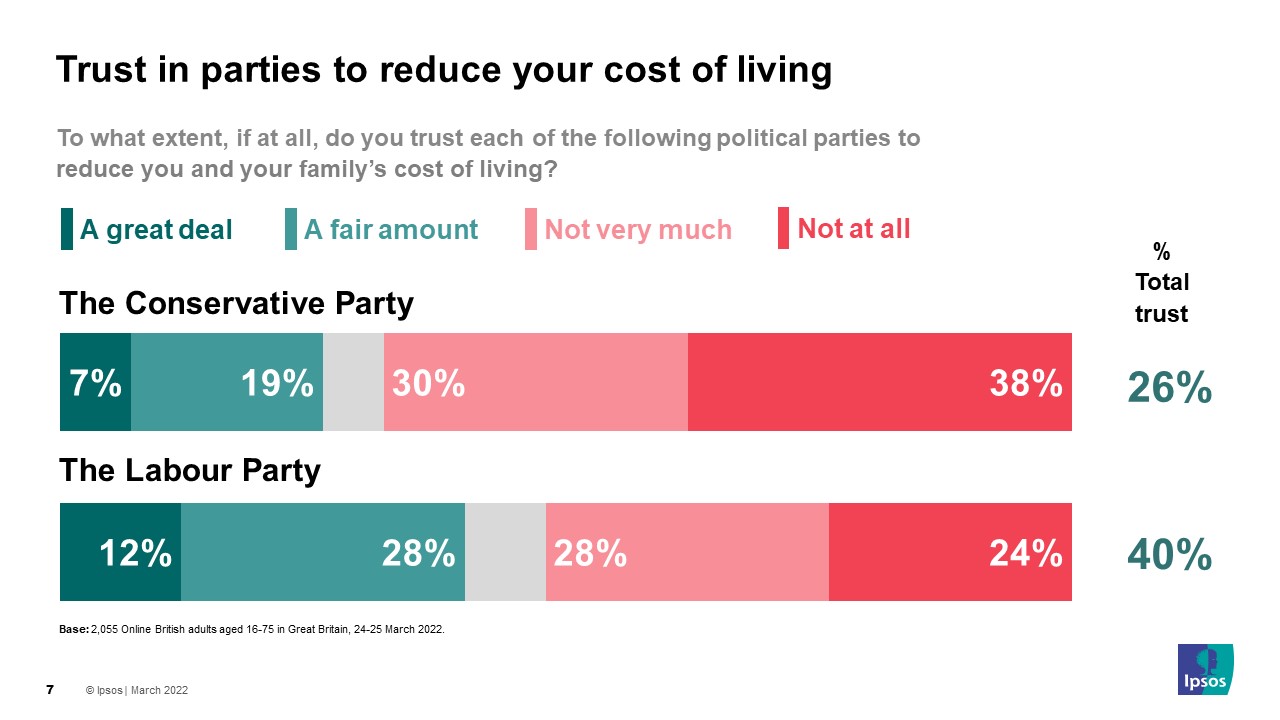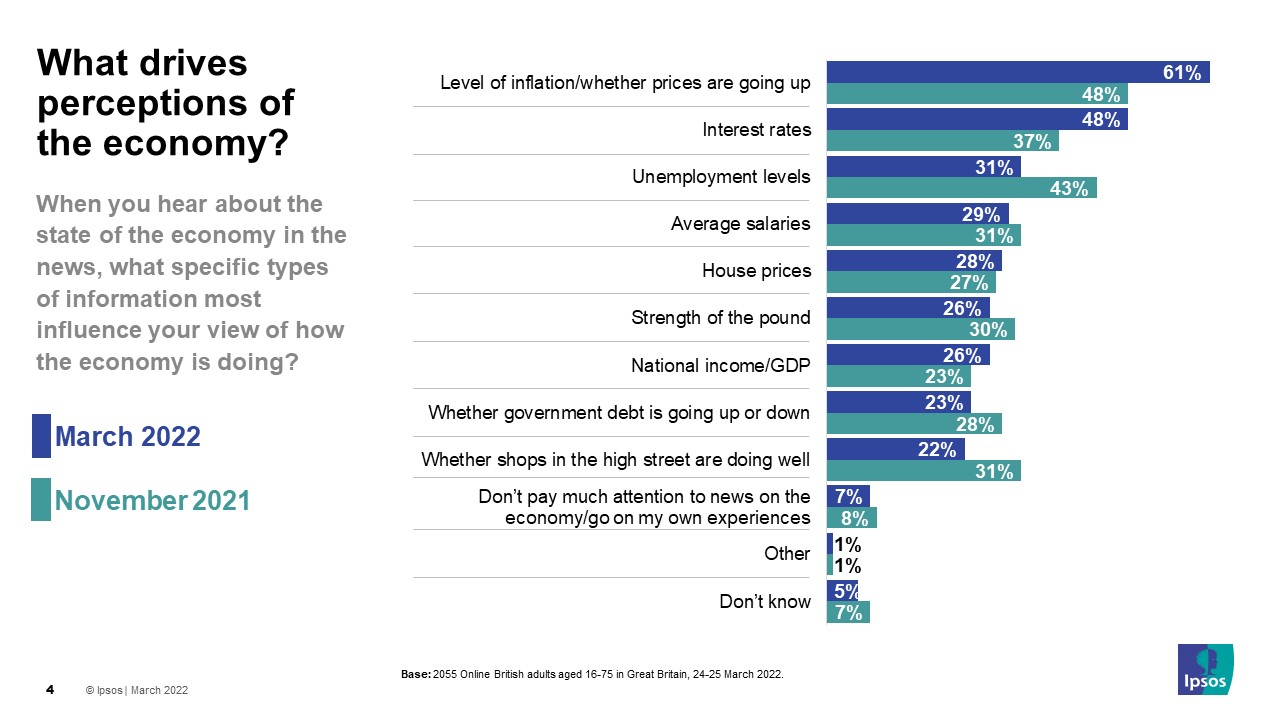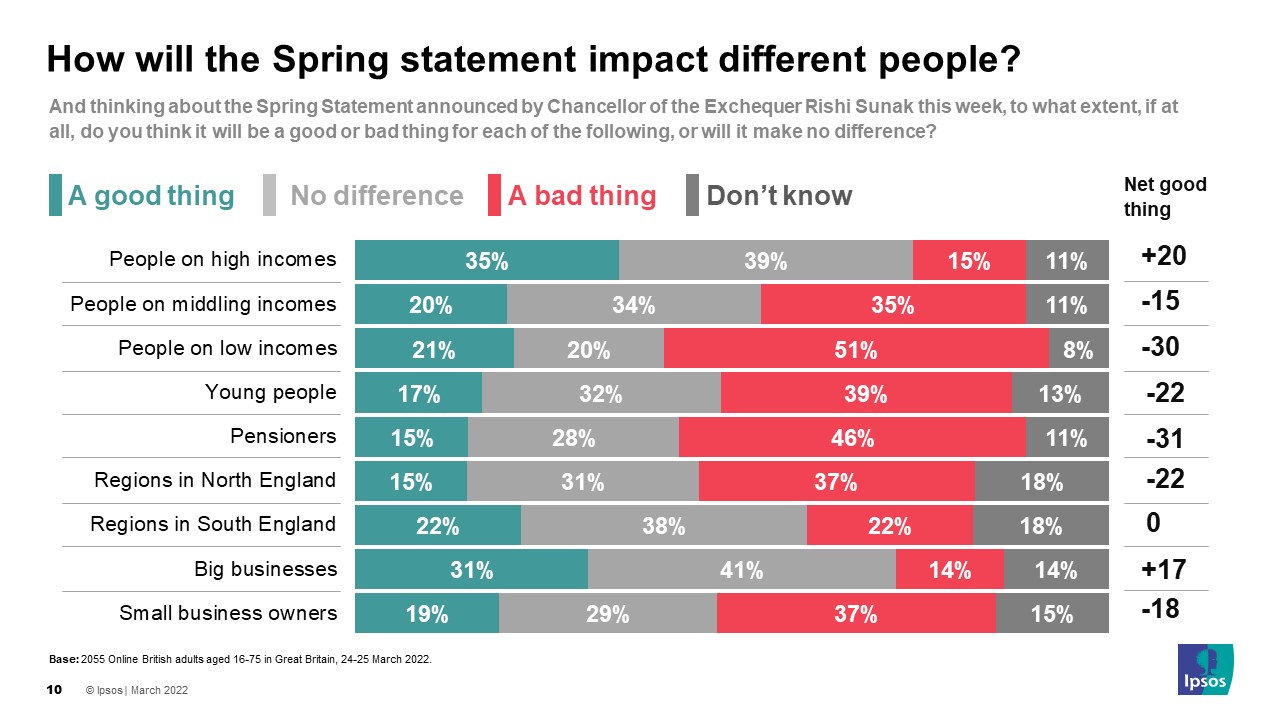Two-thirds of Britons do not trust the Conservatives to reduce the cost of living
- Public are more likely to trust the Labour Party to manage Britain’s taxes and public spending (41%) and reduce their cost of living (40%), than the Conservative Party (35% and 26% respectively).
- Meanwhile, Rishi Sunak’s job approval as Chancellor has fallen since the Spring Statement, amidst rising economic pessimism and concern about the cost of living.
Trust on the cost of living and tax / spending
- New polling from Ipsos in the UK, taken after last week’s Spring Statement, shows just one in four Britons (26%) trust the Conservative Party ‘a great deal’ or ‘a fair amount’ to reduce the cost of living – for either them or their families. Two in three (68%) do not trust the Conservatives.
- In contrast, 40% trust Labour to reduce the cost of living but 52% do not.

- When asked about managing Britain’s taxes and public spending we are able to compare results from last week to results from a poll taken earlier in March.
- Today, 35% trust the Conservatives either a great deal or a fair amount to manage Britain’s taxes and spending and 59% do not. On the other hand, 41% trust Labour and 51% do not. Earlier this month, 34% trusted the Conservatives and 35% trusted Labour.
State and meaning of the economy
- There are signs of growing economic pessimism about the state of the economy. 69% of Britons think the state of the British economy is poor (up from 59% in November 2021). 27% think it is good – down 10 points from November (37%).
- When asked what impacts their perception of the economy, price rises and inflation are the number one factor and growing in significance compared to November. 61% cite inflation and price rises as influencing their perceptions of economic health (+13 points from November). Interest rates are second (48%, +11 points).
- When Ipsos asked this question in 2013, the top three answers given were unemployment (52%), inflation/prices (40%) and government debt (38%).

Rishi Sunak and spring statement
- Whereas just 63% of Britons followed the Spring Statement closely (compared to 84% that say they are following the Russian invasion of Ukraine closely), 86% say they are following the rising cost of living closely (51% very closely).
- In this context, Rishi Sunak’s job approval ratings have weakened slightly. Whereas roughly the same number think he is doing a good job as Chancellor compared to a similar poll taken before the Spring Statement (32% today and 34% earlier in March), the proportion that think he is doing a bad job has increased from 25% in early March to 33% today.
- Meanwhile, the proportion of Britons that think Sunak has changed the British economy for the worse has increased from 31% in October to 42% in our most recent poll. Just 16% think Sunak has changed things for the better, compared to 21% in October.
- Just 1 in 5 Britons have confidence that Sunak will change the economy for the better in future (down 4 points from October), 37% think he will change it for the worse (up 7 points).
- In terms of how the Spring Statement will impact different groups, the public are most likely to see it as a good thing for people on high incomes (35%) and big businesses (31%). They are most likely to see it as a bad thing for people on low incomes (51%), pensioners (46%), young people (39%), northern regions / small business owners (both 37%) and people on middle incomes (35%).

- Compared to last October’s budget, patterns are quite similar but more think the Spring Statement will be a bad thing for some groups. For example, the proportion of Britons that think the Spring Statement will be a bad thing for people on low incomes is 51% (vs 39% for October’s budget). For young people 39% say the same now compared to 30% at October’s budget, for pensioners it is 46% now versus 34% last October, for northern regions it is 37% now versus 25% in October and for small business owners it is 37% now compared to 27% at the last budget in October.
Factors influencing cost of living
The public do not hold the government entirely to blame for the rising cost of living:
- 78% think the COVID 19 pandemic is contributing a great deal or a fair amount to the rising cost of living.
- 77% say the same about the global economic situation generally and 73% say the same about the Russian invasion of Ukraine. 67% say the same about businesses making excessive profits.
- However, 64% do think the Conservative government’s economic policies are contributing to the rising cost of living at least ‘a fair amount’. 1 in 3 (32%) think they are contributing ‘a great deal’.
- 64% think Britain leaving the EU is contributing to the rising cost of living and half (50%) say net zero policies to combat climate change are contributing.
Ipsos Director of Politics in the UK Keiran Pedley said:
These numbers clearly show the political risk facing the Conservatives concerning the rising cost of living. The public are following stories about it closely and are increasingly judging the performance of the economy overall with the cost of living directly. This matters because they are also more inclined to trust Labour to reduce the cost of living than the Conservatives.
Meanwhile, whilst the public clearly do not blame the government alone for the rising cost of living, there are some signs of concern at how its most recent response – the Spring Statement – will impact certain potentially vulnerable groups. If this sense of pessimism persists, the Conservatives may be in for a difficult time politically in the future.
Technical Note:
The data above is taken from two polls:
- For all but one question data refers to the poll where Ipsos interviewed a representative sample of 2,055 British adults aged 16-75 online on 24th and 25th March 2022 using the Ipsos Digital Omnibus.
- The one exception is the question related to factors impacting the cost of living. This data was taken from a separate poll where Ipsos interviewed a representative sample of 1,036 British adults aged 16-75 online on 28th and 29th March 2022 using the same Ipsos Digital Omnibus.
- For both polls data are weighted to match the profile of the population. All polls are subject to a wide range of potential sources of error.






